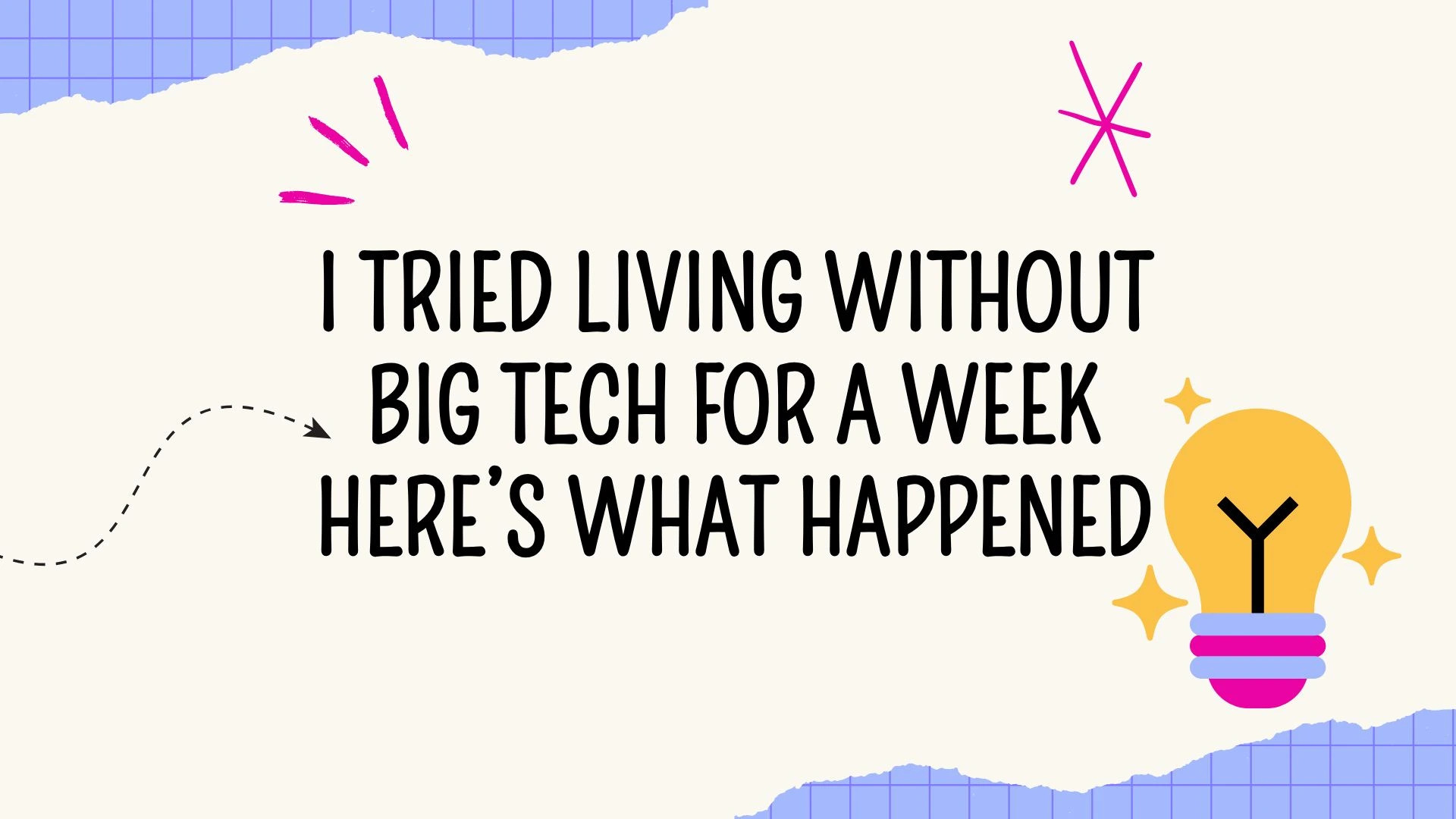I Tried Living Without Big Tech for a Week
Introduction: Can You Really Escape Big Tech?
Is it even possible to live without Big Tech in today’s world? That’s the question I set out to answer when I decided to go one full week without using any services from the tech giants – Google, Apple, Amazon, Facebook (Meta), and Microsoft.
Spoiler alert: It was way harder than I expected.
From struggling to find alternative apps to realizing just how much of my daily routine depended on Big Tech, this challenge pushed me to rethink my digital habits, privacy, and reliance on major tech corporations. Here’s how it went.
The Rules: What I Had to Give Up
Before diving in, I had to set some ground rules:
✅ No Google products (Search, Gmail, YouTube, Google Docs, Android, Google Maps)
✅ No Apple services (iCloud, Apple Music, Safari, iPhone’s App Store)
✅ No Amazon (Prime, Kindle, Alexa, AWS-hosted websites)
✅ No Facebook-owned apps (Instagram, WhatsApp, Messenger, Facebook)
✅ No Microsoft products (Windows, Office, LinkedIn, OneDrive)
The exceptions: I allowed myself to use the internet (duh), but only through privacy-focused services and open-source software.
Day 1: Immediate Struggles and Workarounds
The first day felt like trying to live without electricity.
Search Engine Problems
I default to Google Search for literally everything, so switching to DuckDuckGo and Brave Search felt like stepping into an unfamiliar world. The results weren’t terrible, but I missed Google’s personalized, fast, and predictive search experience.
No YouTube, No Fun
I realized how much I rely on YouTube for everything—tutorials, entertainment, and even news. I tried alternatives like Odysee and Peertube, but they don’t have nearly the same content selection.
No Gmail, No Workflow
Email was a nightmare. I switched to ProtonMail, which is great for privacy, but it’s nowhere near as seamless as Gmail. My inbox felt clunky and my emails lacked the easy organization I was used to.
Messaging Got Weird
Without WhatsApp, Facebook Messenger, or iMessage, I had to convince friends to use Signal and Telegram. Some did, but many refused—leaving me feeling disconnected.
Day 2: Finding Big Tech Alternatives
I had to start looking for privacy-focused alternatives to my everyday apps. Here’s what I found:
- Google Search → DuckDuckGo / Brave Search
- Gmail → ProtonMail
- Google Maps → OpenStreetMap
- YouTube → Odysee / Peertube
- Amazon → Local retailers & eBay
- Facebook/Instagram → Mastodon / Pixelfed
- WhatsApp → Signal / Telegram
- Google Docs → LibreOffice / CryptPad
While some alternatives worked well, others felt clunky, outdated, or lacked users.
Day 3-4: The Amazon Withdrawal Hits Hard
One of the biggest challenges was not using Amazon.
Need a last-minute purchase? Forget Amazon Prime. I had to find local retailers or use alternative online stores like Newegg, eBay, and local bookshops.
🚨 Surprising Problem: Many e-commerce sites still run on Amazon Web Services (AWS), meaning I was technically still using Amazon without even realizing it.
The convenience factor was sorely missed—shopping without Amazon felt like going back in time to 2010.
Day 5-6: Adjusting to a New Digital Reality
By mid-week, I started feeling less reliant on Big Tech.
Privacy Felt Good
Using privacy-first apps made me feel more secure. No more targeted ads stalking me across the internet. My inbox had fewer spam emails.
My Screen Time Decreased
Without Facebook, Instagram, or YouTube, I spent less time mindlessly scrolling and more time actually doing things—reading, exercising, and going outside.
Navigation Became a Hassle
Apple Maps and Google Maps are too good, and I took them for granted. OpenStreetMap was a usable alternative but lacked real-time traffic updates, making navigation trickier.
Day 7: Final Thoughts and What I Learned
By the end of the challenge, I realized:
✔ Big Tech is deeply embedded in daily life—avoiding it completely is almost impossible.
✔ Some alternatives work well, but they lack convenience and mass adoption.
✔ You trade privacy for convenience—Big Tech offers seamless services at the cost of your data.
✔ Reducing reliance is possible—even if you can’t fully escape, minimizing your dependence on Big Tech is worth considering.
Would I quit Big Tech forever? Probably not. But I’ll definitely be more mindful about where I spend my time and data.
Conclusion: Can You Live Without Big Tech?
Going completely Big Tech-free isn’t realistic for most people—but reducing dependence is possible. Even small changes, like switching to privacy-focused services, shopping locally, or using open-source alternatives, can give you more control over your digital life.
So, would you try living without Big Tech? Or is the convenience too hard to give up? 🤔
Frequently Asked Questions (FAQs)
1. Is it actually possible to live without Big Tech?
It’s extremely difficult but not impossible. However, you’ll face major inconveniences since most online services are powered by Google, Amazon, Apple, Facebook, or Microsoft.
2. What are the best alternatives to Google and Amazon?
For search, DuckDuckGo and Brave Search work well. For shopping, eBay, Newegg, and local stores are good Amazon alternatives.
3. What was the hardest part of avoiding Big Tech?
Not having Google Search, YouTube, and Amazon made life significantly harder. Social media alternatives like Mastodon also felt empty compared to Facebook and Instagram.
4. Did quitting Big Tech improve your privacy?
Yes! I noticed fewer targeted ads, less spam, and more control over my data when using privacy-focused apps.
5. Would you do this challenge again?
I might—but with some modifications. Instead of quitting cold turkey, I’d focus on reducing my reliance on Big Tech rather than eliminating it completely.
Would you ever try ditching Big Tech? Let me know your thoughts! 💬
living without big tech, quitting big tech, big tech alternatives, digital detox, life without Google, ditching Amazon, avoiding social media, privacy-focused apps, living without tech giants, tech-free life




